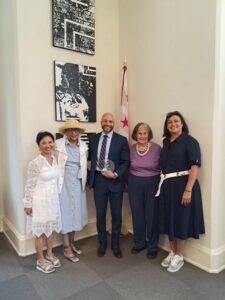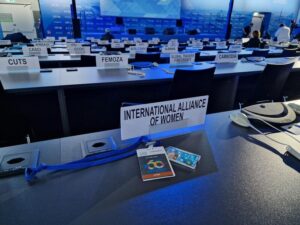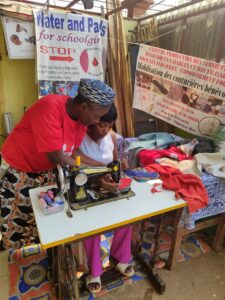Beijing +25 Civil Society Forum of UNECE and Regional UNECE meeting 28-30 October 2019
On the 28th of October 2019, 420 participants from 48 different countries gathered in Geneva to participate in the Beijing+25 Civil Society Forum of UNECE for movement building, advocacy, strategizing and solidarity action. They addressed the structural barriers in the region that stop them from realizing their full rights.
Feminists mapped their successes such as progressive legal frameworks and they tried to make sure they are implemented on the ground. Their demands were transmitted to the intergovernmental meeting that took place 29-30 October in Geneva.
The core framing principles of their discussions were gender equality and justice, women’s human rights and socio-economic and environment sustainability. They also tackled intersecting inequalities and multiple forms of discrimination based on gender, age, class, caste, race, ethnicity, sexual orientation, gender identity and expression and sex characteristics, disability and other status.
22 thematic position papers and six regional position papers were discussed at the Forum in break out groups. The Civil Society Forum was coordinated by Women in Europe for a Common Future which is part of the Women’s Major Group. Other organizers included NGO CSW Geneva, Soroptimists International, Make Mothers Matter, etc.
The lack of resources to this meeting made difficult the pulling together of a strong and cohesive voice.
The opening statement, which was presented at the opening session of the UNECE Regional Review meeting had been drafted during the late evening/night of the 28th of October with no time for consultations on the contents. Participants were asked to endorse the statement one hour before it was presented. The EWL considered that the lack of a consultation process excluded voices of women in particular those of survivors of prostitution and women in prostitution. The EWL representing over 2000 women’s organizations made every attempt to include these voices in the final statement proposing a number of different solutions including endorsing with reservation to some parts of the document. However, none of its proposals was accepted. The EWL therefore decided not to endorse the statement.
On the other hand, the EWL acknowledged the all importance of the shrinking space for civil society and called on women and feminist organizations to remain united in trying to deal with this very important challenge as they have more in common that unites them than divides them.
Moreover, the EWL called for the investment in women’s rights as the core commitment for a more sustainable democratic and inclusive world.
Intervention by Women’s Major Group – Creating a Just & Sustainable Future
The statement presented by the Forum to the governmental meeting was drafted by a young feminist, İlayda Eskitaşçıoğlu, a 26-year-old lawyer and PhD student at Koç University researching international human rights law, who said they had widely consulted with women’s and feminist organizations and women participating in the meeting.
There were cross-cutting recommendations to all themes in particular concerning disadvantaged, marginalized and vulnerable groups of women, which were the following:
- The lack of segregated data focusing on intersectional identities
- More female inclusion and participation in politics and decision-making
- More funding and concrete steps for implementation of legislative frameworks.
Having mentioned these cross-cutting recommendations we now move on to specific ones per theme.
Under the first part of the statement with the title of inclusion there is a demand for structural changes in order to facilitate the involvement of young feminists in decision-making processes and for the protection of their rights. There are also demands for the protection of the rights of LBTI and gender non-conforming women and people, the rights of women with disabilities, of migrant women, of indigenous and roma people, of rural women, of widows and of older women.
The second part of the statement refers to emerging problems and structural challenges that have to do with: addressing anti-women’s rights groups, shrinking spaces, neo-conservatism and women’s human right’s defenders, the impact of the climate crisis and of the environment on women’s rights, of structural economic barriers to women’s rights, of violence against women, of promotion of women’s political participation. The recommendations also called for tax justice to redistribute wealth and power which would automatically contribute to gender equality as well as for promotion of the human rights of women in the media (tackle online harassment, impunity of social media corporations and of the advertisement sector, etc).
The third part of the statement deals with areas that need more focus and how to pave the way forward in the Beijing +25 process which have to do with: accountability and monitoring, sexual and reproductive health and rights, peace and security and displaced women, women labor movements, education, knowledge transfer and access to technologies, financing for implementation of the Beijing Platform for Action, corporate and institutional accountability to the Beijing +25 process.
UN Women is criticized for appearing to take sides on decriminalizing “sex work”
During the meeting of the Beijing +25 Civil Society Forum a group of civil society organizations criticized UN Women for appearing to take sides on decriminalizing sex work.
The Coalition against trafficking in Women which has networks across four global regions said that the campaign to decriminalize prostitution and promote the concept of sex work has received considerable financial support from private foundations and international health and development institutions that play integral roles in certain UN Women’s decision-making processes.
The Coalition circulated a petition that received more than 1300 signatures, which warned that a growing global movement to decriminalize and rebrand prostitution as sex work could lead to more not less violence against the world’s most vulnerable women and girls.
The petition was sent to Phumzile Mlambo-Ngcuka, the executive Director of UN Women and two associates working with her on charting the agency’s course.
Central to the criticism from the civil society coalition is that applicants, who want to participate in the UN Women advisory panel, called the group of 21 which is heavily weighted toward nine mainly Western countries where support for decriminalization has been relatively strong.
The question is whether Western feminists and women’s rights activists are the best judges of the circumstances in which millions of powerless girls and women live in poorer countries.
The Beijing +25 UNECE Regional Review meeting – 29-30 of October 2019.
On the occasion of the 25th anniversary of the Beijing Declaration and Platform for Action more than 850 participants from North America, Europe, the Caucasus and Central Asia including 47 government delegations, 8 Ministers, Deputy Ministers, State Secretaries, 81 Civil Society organizations gathered in Geneva on 29th-30th of October to take stock on the progress of Beijing commitments. 51 National Review Reports were submitted to the meeting while 10 Side Events were organized during the UNECE meeting.
Despite progress many of the challenges addressed in Beijing remain a reality in the 56 countries members of the UN Economic Commission for Europe (UNECE). “2020 is an important year in terms of gender equality and women’s rights. It is not enough to have hope, we need decisive actions. We need to change mindsets and traditions”, stressed Altynai Omurbekova, Deputy Prime Minister of the Kyrgyz Republic, co-chair of the meeting.
According to the European Women’s Lobby “despite growing evidence that the patriarchal neo-liberal economic system is unsustainable, the obsession with growth in GDP remains central to our economic policies. The neo-liberal model reinforces gender stereotypes. Women and girls continue to face inequalities within the formal employment sector throughout their life cycle. The gender pay, pension and poverty gaps remain endemic and unpaid care and domestic work remains unrecognized in an entrenched outdated male breadwinner model. Stringent austerity measures have disproportionately impacted women who already face multiple forms of discrimination: poor women, women from ethnic minorities, women of color, women with disabilities and older women. There can be no business-as-usual; the economy must serve the wellbeing of all, and not the other way round. Feminist economists are an inspiration for a radical new vision for people and the planet, including the care economy. We call on all EU member states to deliver a feminist economic model for the wellbeing of all, putting the care of ourselves, each other and the planet at its core.
In Europe as in many other parts of the world, we have seen growing anti-feminist populism, which promotes patriarchal traditional values which directly threaten women’s human rights, and push back on women’s sexual and reproductive health and rights (SRHR). The shrinking space of civil society is silencing women’s collective voices and withdrawing funding for women’s organizations. This must urgently be addressed as a priority for now and the future. A vibrant, independent critical civil society feminist movement is vital for democracy and fundamental to achieving women’s human rights.”
The Beijing +25 Regional Review Meeting, jointly hosted by UNECE and UN Women, reviewed progress and persisting challenges, showcasing practical policy approaches that can help remove the structural barriers that hold women back from equal participation in all areas of life. Participants stressed the need for faster and stronger progress for women and girls and urgent realization of the commitments to uphold their human rights. Over the last five years, countries in the region have put a particular focus on three main areas: combatting violence against women, women’s economic empowerment and political participation.
“For the first time, the strategic objectives of the Beijing Platform for Action can be linked to a time-bound framework – that of the 2030 Agenda for Sustainable Development. Let’s work together to turn the goal of gender equality into reality by 2030”, stated UNECE Executive Secretary Olga Algayerova.
“A quarter of a century after Beijing, not a single country has achieved gender equality. Beijing +25 and the global drive to achieve Sustainable Development Goals provide us a unique opportunity to accelerate efforts, strengthen our partnerships and mobilize all of society, including all generations, to fulfill the longstanding commitments to women and girls”, said Åsa Regnér, Assistant Secretary-General of the United Nations and Deputy Executive Director of UN Women.
During the UNECE Regional Meeting, eight thematic panels took place which were focused on the following key issues: key trends on gender equality in the ECE region, closing the gender gaps through effective economic and social policies, ending violence against women and girls, education for gender equality as a powerful tool for transformation, financing for gender equality, women’s representations in policy-making and decision making, empowering women to build climate resilience and global goals and the Beijing commitments.
Key conclusions of the Beijing +25 UNECE Review Meeting
- Despite legislative advances implementation of the Conventions across the region including the Istanbul Convention remains weak and states are not guarantying their due diligence obligations. The emerging challenge of online forms of violence like cyberstalking, trolling and the distribution of intimate images continues to require adequate policy responses.
- Significant efforts were made to support women’s inclusion into the workforce but gaps in policies and their effective implementation continue to impede progress. Women continue to experience lower employment rates and lower pay compared to men.
- Progress in women’s political participation across the region remains uneven and particularly low at the local level.
- Structural inequalities persist, policy responses need to be equally persistent and far reaching.
- The lack of financing for gender equality is one of the greatest barriers to achieving gender equality. In several countries, gender equality machineries remain weak and underfunded.
- Need to adopt comprehensive and equitable policies to prevent gender discrimination and to dismantle barriers to education and lifelong learning. More action is needed to tackle gender stereotypes that perpetuate segregation in both education and STEM fields.
- Insufficient gender disaggregated data collection constitutes a significant barrier to evidence-based policy making.
- Gender equality should be inclusive of all women.
- Changing social norms and unequal expectations remains critical and for that men need also to be involved.
- Environmental protection and climate change constitute the areas with the least advances across the region.
Global goals and the Beijing+25 Commitments of the UNECE region.
The 2030 Agenda for sustainable development has affirmed the achievement of gender equality as a stand-alone goal as well as a prerequisite for the attainment of all the other SDGs.
Policy Recommendations
- Protect freedom of association and the right to collective bargaining to ensure equal opportunities between women and men.
- Ratify the ILO Violence and Harassment Convention of 2019 (No 190) and accompanying Recommendation (No 106).
- Invest in gender responsive public services and care and promote the reconciliation of work and family by ratifying and implementing ILO Maternity Protection Convention of 2000 (No 183).
- Prioritize the social inclusion of women in legislation and practice.
- Implement the Council of Europe’s recommendation on preventing and combatting sexism.
- Train health workers on sexual and reproductive health and gender-based violence and enhance availability of and access to related health services.
- Implement Council of Europe’s first ever recommendation on measures to combat discrimination on grounds of sexual orientation or gender identity.
- Promote the broad and meaningful participation of civil society, women’s organizations and marginalized groups in decision- and policy-making at all levels, including through innovative modalities and new technologies. The participation of young women and youth should be encouraged.
- Actual implementation of national legislation and international commitments and accountability for gender equality is crucial.
- Accelerate the implementation of UN Security resolution 1325 on women, peace and security, including through dedicated commitments in national action plans.
- Mainstream gender into policies on environmental conservation, protection and rehabilitation and climate change.
- Improve regional/international cooperation and exchange in all areas related to the Beijing commitments.


